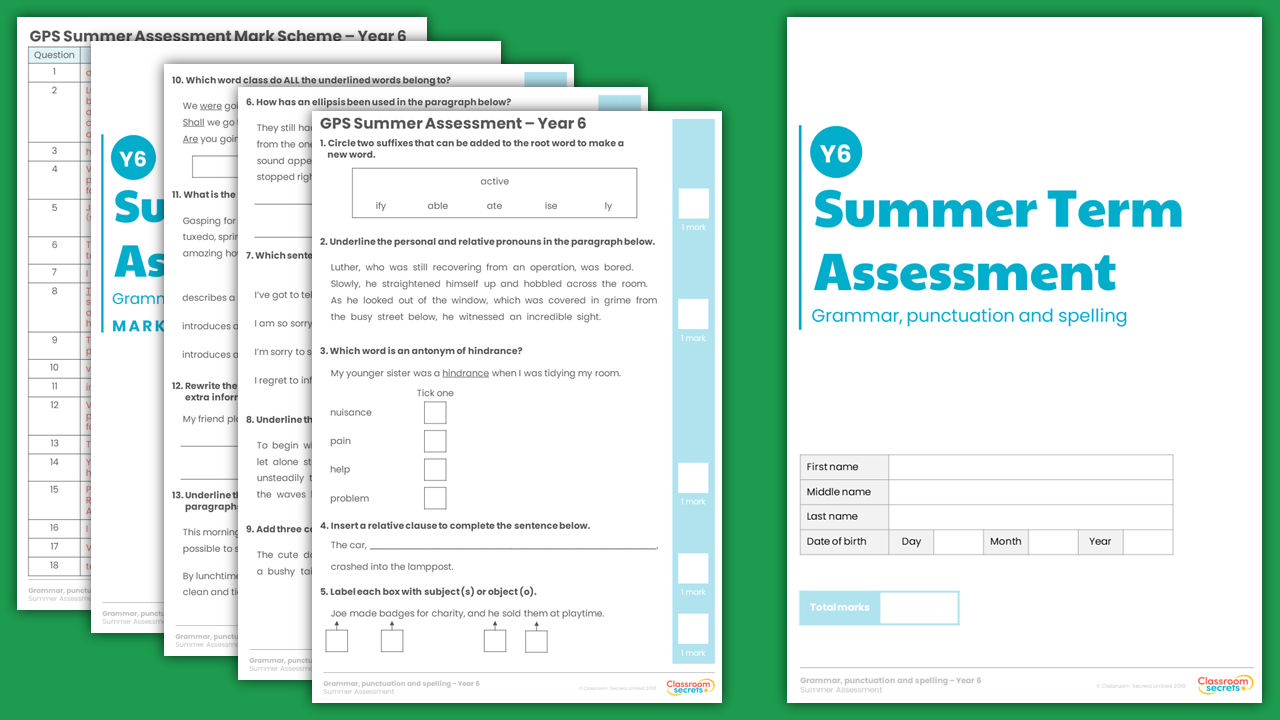Summer Year 6 GPS Assessment
Summer Year 6 GPS Assessment Resource Pack
This Summer Year 6 GPS Assessment Resource Pack has been created to assess pupil knowledge of all the blocks and small steps covered so far in the Summer term. The pack includes an SATs style assessment with 18 questions linked to all of the small steps in Summer; a mark scheme with content domain coverage, small step coverage with suggested levels and a teacher assessment spreadsheet to identify pupils working at Year 6 Emerging, Year 6 Developing, Year 6 Expected or Year 6 Greater Depth. These levels are currently provided as a guideline only.
Not a member? Sign up here.
What's included in the pack?
This pack includes:
- Summer Year 6 Grammar, Punctuation and Spelling Assessment with questions linked to each small step from all Year 6 Summer Blocks
- Summer Year 6 Grammar, Punctuation and Spelling Mark Scheme outlining small steps and content domain coverage for each question and suggested levels
- Summer Year 6 Grammar, Punctuation and Spelling Teacher Assessment Sheet to help identify each child's level using scores collected
Year 6 National Curriculum Objectives:
Summer Block 1 Cohesion
- English Year 4: (4G1.5) Choosing nouns or pronouns appropriately for clarity and cohesion and to avoid repetition
- English Year 4: (4G1.5) Appropriate choice of pronoun or noun within and across sentences to aid cohesion and avoid repetition
- English Year 5: (5G3.1a) Using relative clauses beginning with who, which, where, when, whose, that or with an implied (ie omitted) relative pronoun
- English Year 5: (5G5.9) Using brackets, dashes or commas to indicate parenthesis
Terminology for pupils:
- (5G1.5b) relative pronoun
- (5G5.9) parenthesis
- (5G3.1a) relative clause
- (5G5.9) bracket
- (4G1.6a) adverbial
- (5G5.9) dash
- (4G1.5) pronoun
- (5G1.5) cohesion
- (4G1.5a) possessive pronoun
- (5G1.5b) relative pronoun
Small Steps
- Recognising Devices to Build Cohesion
- Paragraphs in Fiction
- Paragraphs in Non-fiction
- Organising Sentences within Paragraphs
- Organising Paragraphs within Texts
- Avoiding Repetition
- Using Devices to Build Cohesion
Summer Block 2 Consolidation
English Year 5: (5G3.1a) Using relative clauses beginning with who, which, where, when, whose, that or with an implied (ie omitted) relative pronoun
Terminology for pupils:
- (5G1.5b) relative pronoun
- (5G3.1a) relative clause
Terminology for pupils:
- (2G1.1) noun
- (2G1.2) verb
- (2G1.3) adjective
- (2G1.6) adverb
- (3G1.4) conjunction
- (3G1.7) preposition
- (4G1.8) determiner
- (6G1.9) subject
- (6G1.9) object
- English Year 5: (5G6.2) Verb prefixes [for example, dis–, de–, mis–, over– and re–]
- English Year 5: (5G6.3) Converting nouns or adjectives into verbs using suffixes [for example, –ate; –ise; –ify]
- (5G5.9) Using brackets, dashes or commas to indicate parenthesis
- Terminology for pupils:
- (5G5.9) parenthesis
- (5G5.9) bracket
- (5G5.9) dash
English Year 5: (5G5.9) Using brackets, dashes or commas to indicate parenthesis
English Year 6:(6G5.13) Using hyphens to avoid ambiguity
English Year 6: (6G5.13) How hyphens can be used to avoid ambiguity [for example, man eating shark versus man-eating shark, or recover versus re-cover]
Terminology for pupils:
- (6G5.13) hyphen
- (5G5.9) parenthesis
- (5G5.9) bracket
- (5G5.9) dash
English Year 6: (6G5.14) Punctuating bullet points consistently
English Year 6: (6G5.14) Punctuation of bullet points to list information
English Year 6: (6G5.10) Using a colon to introduce a list
English Year 6: (6G5.10) Use of the colon to introduce a list
English Year 6: (6G5.11) Use of semi-colons within lists
Terminology for pupils:
- English Year 6: (6G5.14) bullet points
- English Year 6: (6G5.10) colon
- English Year 6: (6G5.11) semi-colon
English Year 6: (6G6.1) How words are related by meaning as synonyms and antonyms [for example, big, large, little]
Terminology for pupils:
- English Year 6: (6G7.4) Recognising vocabulary and structures that are appropriate for formal speech and writing, including subjunctive forms
- English Year 6: (6G7.2) The difference between vocabulary typical of informal speech and vocabulary appropriate for formal speech and writing [for example, find out – discover; ask for – request; go in – enter]
- English Year 6: (6G7.3) The difference between structures typical of informal speech and structures appropriate for formal speech and writing [for example, the use of question tags: He’s your friend, isn’t he?, or the use of subjunctive forms such as If I were or Were they to come in some very formal writing and speech]
- Draft and write by selecting appropriate grammar and vocabulary, understanding how such choices can change and enhance meaning.
- Draft and write by using a wide range of devices to build cohesion within and across paragraphs
- Draft and write by using further organisational and presentational devices to structure text and to guide the reader [for example, headings, bullet points, underlining]
Small Steps
1. Consolidating Relative Clauses
2. Consolidating Word Classes 1
3. Consolidating Word Classes 2
4. Consolidating Prefixes and Suffixes
5. Consolidating Parenthesis 1
6. Consolidating Parenthesis 2
7. Consolidating Lists
8. Consolidating Synonyms and Antonyms
9. Consolidating Formal and Informal Writing
10. Consolidating Redrafting - Sentences
11. Consolidating Redrafting - Paragraphs
This resource is available to download with a Premium subscription.







